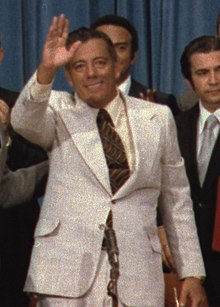Maximum Leader of the Panamanian Revolution Omar Torrijos | |
|---|---|
 Torrijos in 1978 | |
| Military Leader of Panama | |
| In office October 11, 1968 – July 31, 1981 | |
| President | José María Pinilla (1968–69) Demetrio Lakas Bahas (1969–78) Arístides Royo (1978–82) |
| Preceded by | Arnulfo Arias (President) |
| Succeeded by | Rubén Darío Paredes |
| Personal details | |
| Born | Omar Efraín Torrijos Herrera February 13, 1929 Santiago, Panama |
| Died | July 31, 1981 (aged 52) near Penonomé, Panama |
| Resting place | Torrijos Mausoleum Amador, Panama City, Panama |
| Political party | Democratic Revolutionary Party (1979–1981) |
| Spouse | Raquel Pauzner de Torrijos |
| Children | 3 |
| Occupation | Military Officer and Leader |
| Signature |  |
| Military service | |
| Allegiance | |
| Branch/service | National Guard of Panama |
| Years of service | 1950-1981 |
| Rank | Brigadier General |
Omar Efraín Torrijos Herrera (February 13, 1929 – July 31, 1981) was a Panamanian military leader of Panama, as well as the Commander of the Panamanian National Guard from 1968 to his death in 1981. Torrijos was never officially the president of Panama, but instead held self-imposed and all-encompassing titles including "Maximum Leader of the Panamanian Revolution". Torrijos took power in a coup d'état and instituted a number of social reforms.
Torrijos is best known for negotiating the 1977 Torrijos–Carter Treaties that eventually gave Panama full sovereignty over the Panama Canal. The two treaties guaranteed that Panama would gain control of the Panama Canal after 1999, ending the control of the canal that the U.S. had exercised since 1903. On December 31, 1999, the final phase of the treaty, the US relinquished control of the Panama Canal and all areas in what had been the Panama Canal Zone.
His son Martín Torrijos was elected president and served from 2004 to 2009.[1]
- ^ "Panama Swears In President Martin Torrijos - 2004-09-01". Voice of America. October 28, 2009. Retrieved July 8, 2024.